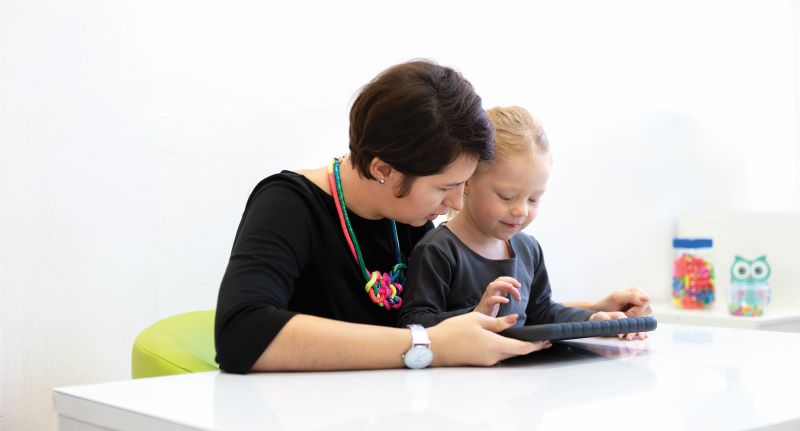Advocating for a seat at the table
As occupational therapy practitioners (OTPs), advocating for a seat at the table is more important now than ever before. Across the country, schools are emerging from years of educational disruption due to the COVID-19 pandemic and post-pandemic needs of students. School teams are continuing to explore or refine how they are addressing the accelerating youth mental health crisis while simultaneously focusing on academic achievement. Although OTPs have been part of the educational system for more than 2 decades, there continues to be a lack of understanding regarding the skill set, scope, and value that OTPs can bring to fill the intensity of mental health needs in the educational setting (Bolton & Plattner, 2020), especially in times of disruption. Defined as a related service provider in the Individuals with Disabilities Education Improvement Act of 2004 (IDEA) and as a specialized instructional support personnel (SISP) in Every Student Succeeds Act (ESSA) OTPs are qualified to support all students and yet continue to be missing in the conversation regarding student wellness.

Rooted in psychiatry, the philosophy of occupational therapy focuses on every aspect of a person’s well-being; recognizing that every person has unique physical, cognitive, and social-emotional needs that are met through engaging in occupations. This foundation, coupled with the unique lens of activity and environmental analysis, understanding of sensory processing and its impact on regulation, and skilled observation and ability to establish therapeutic rapport, gives OTPs a distinct position to discern between the implications of an organic mental health condition and the impact of varying psychosocial factors on mental health. In a field dominated by talk therapy, a focus on sensory regulation using a bottom-up, neurobiological approach to enhance participation and performance is a missing link and critical strength of OTPs. Not only do practitioners have the ability to focus on the root of the problem, but our interventions use client-centered and strengths-based approaches to empower and guide students to overcome barriers. This not only mitigates the impact of the challenges they are facing, but also increases confidence for future participation (Wilburn et al., 2021).
The accelerating mental health needs of children and youth (Lebrun-Harris et al., 2022; Leeb et al., 2020) and the growing demand for qualified mental and behavioral health providers (Long et al., 2022), has highlighted how vital interdisciplinary models are to equitably supporting student wellness. OTPs are the only professionals with the vast skill set needed to transform our schools from academic hubs to spaces of wellness.
As discussed by Pfirman and colleagues (2023), using an OTP-led school-based mental health team resulted in dramatically positive outcomes during a 3-year pilot of social–emotional programming. The outcomes show that, although all professions react to student behavior, OTPs have the specialized training to identify the root cause of behaviors and proactively address the needs of the whole child.
Establishing wellness promotion can only be accomplished with systems-level innovation resulting from advocacy. One of those voices, in our experience, must be OTPs. This centers OTPs as educational leaders with the knowledge and credentials to inform mental health care for all students. Continuously advocating for OTPs to be at the table is not the only way to ensure that pilots and programs such as those created by Pfirman and colleagues (2023) continue, but also to ensure that our scope of practice for OTPs within schools isn’t further constricted. Recently, the authors have had myriad opportunities to showcase what and how OTPs can contribute to improving school-based mental health, by having direct conversations with local and state practitioners and policy makers, participating in panel-based discussions with mental health providers, co-chairing a large youth mental health collaborative, directing a non-profit focused on school-based mental health systems, and maintaining private practice community efforts. Being able to highlight OTPs as leaders in educational practice has proven essential to growing successful school-based mental health initiatives and changing mindsets for why OTPs deserve a seat at the table.
References
Bolton, T., & Plattner, L. (2019). Occupational therapy role in school-based practice: Perspectives from teachers and OTs. Journal of Occupational Therapy, Schools, & Early Intervention, 13, 136–146. https://doi.org/10.1080/19411243.2019.1636749
Every Student Succeeds Act, Pub. L. 114-95, 20 U.S.C. 6301 (2015). https://www.congress.gov/114/plaws/publ95/PLAW-114publ95.pdf
Individuals With Disabilities Education Improvement Act of 2004, Pub. L. 108-446, 20 U.S.C. §§ 1400–1482.
Lebrun-Harris, L. A., Ghandour, R. M., Kogan, M. D., & Warren, M. D. (2022). Five-year trends in U.S. children’s health and well-being, 2016–2020. JAMA Pediatrics, 176, 1–11. https://doi.org/10.1001/jamapediatrics.2022.0056
Leeb, R. T., Bitsko, R. H., Radhakrishnan, L., Martinez, P., Njai, R., & Holland, K. M. (2020). Mental health–related emergency department visits among children aged <18 years during the COVID-19 pandemic—United States, January 1–October 17, 2020. Morbidity and Mortality Weekly Report, 69, 1675–1680. https://doi.org/10.15585/mmwr.mm6945a3
Long, M., Coates, E., Price, O. A., & Hoffman, S. B. (2022). Mitigating the impact of Coronavirus disease-2019 on child and family behavioral health: Suggested policy approaches. Journal of Pediatrics, 245, 15–21. https://doi.org/10.1016/j.jpeds.2022.02.009
Pfirman, N., Rivera, C., & Saffer, A. (2023). Health promotion and wellness for all students: School-based occupational therapy as a preventive approach. American Journal of Occupational Therapy, 77, 7702090010. https://doi.org/10.5014/ ajot.2023.050242
Wilburn, V. G., Hoss, A., Pudeler, M., Beukema, E., Rothenbuhler, C., & Stoll, H. B. (2021). Receiving recognition: A case for occupational therapy practitioners as mental and behavioral health providers. American Journal of Occupational Therapy, 75, 7505090010. https://doi.org/10.5014/ajot.2021.044727
Nicole Pfirman, MEd, OTR/L, is the Director of School Based Mental Health Systems for MindPeace in Cincinnati, OH.
Breanna Lynch, MOT, OTR/L, is the Owner of Holding Space Collaborative in Cincinnati, OH.
Abe Saffer, MPM, is a Federal Lobbyist for AOTA.